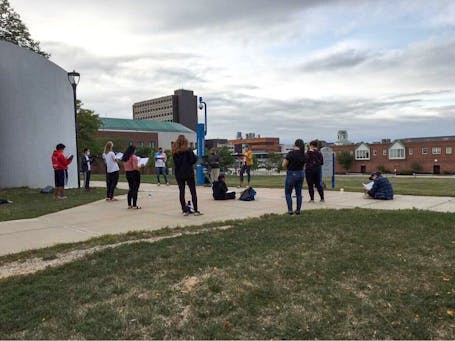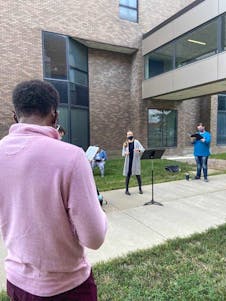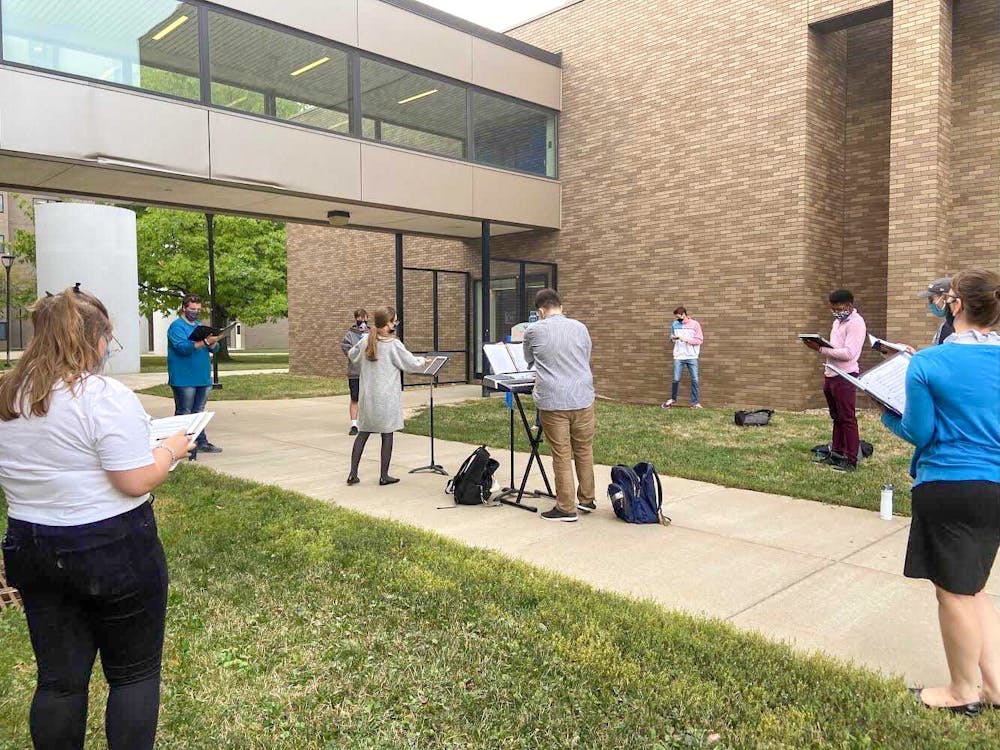With Hogwarts houses, voice projecting headsets and humming, vocal classes look a little different this year.
The Center for Disease Control and Prevention deemed singing to be a risky activity, as it spreads aerosols, so UB professors had to get creative to find ways students could meet and practice their art this semester.

“We have teams, we actually have Hogwarts houses,” said Claudia Brown, the choral director and a clinical assistant professor. “We actually have a rotation, so certain groups come on certain days. The actual House names don’t have any significance. I just thought it would be more fun than Cohorts A, B, C, etc.”
Opening colleges already seemed like a difficult task, but with singing-related cases being heavily publicized, so it was hard to imagine how vocal students could have in person classes. But the vocal professors in UB’s Music Department have found a way to safely teach students through a combination of in person and online classes.
For choral ensembles, students practice outside between Baird Hall and Slee Hall. They are required to wear masks, stay six feet apart and if there is not a breeze, they take 30-minute breaks in between singing to clear the air of aerosols. Larger groups, like the UB Choir, which has 40 students this semester, have to practice in groups of eight, with each group rehearsing on specific scheduled days. The UB Choir has gained 19 new members this semester, which is a normal amount, despite the difficulties of COVID.
Brown’s outdoor classes have two simultaneous rehearsals, led by herself and a TA, Julia Anne Cordani. Both have a keyboard, an accompanist, a voice-amplifying headset and eight students. One positive to outdoor rehearsals Brown noticed is increased visibility.
“We’re really visible now because we’re practicing outside,” Brown said. “So we’ve had a lot of people stopping by to listen or to say ‘do you mind if I sit here and eat my lunch and listen to you?’ and we say ‘yeah of course, you’re welcome to.”
But some vocal lessons must still meet over Zoom. “Fundamentals of Singing,” one of the largest vocal classes, meets virtually. Noa Dubin, a freshman vocal performance major, says their music theory lab is now a once-a-week, 20-minute Zoom meeting with a graduate assistant instead of being in person.
Despite finding some work-arounds, students still face some challenges due to not having in-person classes. Notably, vocal performers cannot sing in the practice rooms, they can only hum.
“We’re allowed to use the practice rooms if you’re a music major or minor, however, you’re not allowed to sing, so you can only hum, which is really difficult,” Dubin said. “So I practice in my room because I can’t practice without singing, that just isn’t feasible for me, because if I’m practicing, I need to use my all.”
Unlike vocalists, instrument players are allowed to use the practice rooms in full. The

International Coalition of Performing Arts Aerosol Study revealed, however, that singing with a mask releases the same amount, or in some cases less, aerosol particles when compared to playing wind instruments with masks and/or instrument covers.
Normally, the department holds social and community building events for students, but these had to be cancelled due to COVID. Though she said her students have been getting to know each other in their small groups, Brown has been checking in on her students more often. And in spite of these conditions, students are still finding ways to socialize.
“I think my students are being more intentional in reaching out to one another and lingering around for distanced conversation,” Brown said. “I feel like there will be a special bond developed between students in this time because they took ownership of this brave new world of singing outside spread very far apart.”
Clinical Assistant Professor Tiffany Du Mouchelle has noticed students using art to cope; some of her students have written songs addressing current U.S. political issues and the pandemic. She has also led emotional discussions in class.
“I think that our students are very lucky that they have music as a daily part of their lives because it really is a wonderful tool to help express and process [our] emotions of what’s going on,” Du Mouchelle said. “I’m currently teaching this specific class called ‘Break On Through,’ which is a class where we kind of talk more about things like performance anxiety and how to own yourself as an artist. We have really intense conversations.”
With the heavy reliance on technology during the pandemic, Du Mouchelle says vocal students are learning new sets of skills, such as how to present themselves in recordings.
“We’re also trying to discuss how to present ourselves using different [online] platforms,” Du Mouchelle said. “[Adjunct Professor of Viola] Leanne Darling has been offering a variety of workshops on recording technology and how to use that for audition purposes.”
Darling has been hosting a webinar called “Music Online: a guide to presenting and recording yourself on the Internet” for the UB community and the general public
“I’m not a technologically inclined person, but I knew I needed to learn in order to keep music alive during Covid while we were all remote,” Darling said. “I made it a habit of trying out different things every week with a group of friends online and through my own research. The webinar grew out of the desire to share and make available in one place all that I have learned during this time.”
Regularly, music students are required to attend a certain number of performances each semester; the number of performances depends on the class and professor. But with both UB and outside performances being limited or axed, the music department had to find an alternative for students to meet their requirements. The solution was to have small performances in Slee Hall as well as outside of Baird Hall, weather permitting. Dubin says music students can sign up to perform in the concerts, or register to be in the audience to meet the viewing requirements. These performances will also help make up for the cancellation of senior-year showcases.
“[It’s] good because we can start performing again,” Dubin said. “We’ve not been [performing] for more than four months so it’s not in our norm, so it’s harder for a lot of us to kind of remember how to perform and how to convey what we what to do on stage.”
The voice department has big plans for the future. In addition to the concerts on Friday afternoons, the UB Choir will livestream a concert before Thanksgiving break. The students will be spread out, and everyone will wear masks. Du Mouchelle also alluded to an event that she’s planning next semester with one of her opera classes that would potentially involve students from other music majors as well.
In December, the UB Choir will release a video of their virtual concert for this semester. The program for the concert is called LUX AETERNA, which means ‘eternal light’ in Latin, to signify all of the featured music pieces about light itself. More information about the concert will be available on the UB Choir and UB Department of Music Facebook pages.
Though this semester has been difficult, many people in the department are trying to stay positive, including Brown.
“When people ask me how the semester is going, I say it’s going really well because we’re still able to sing, we’re still meeting in person, we’re still making music,” Brown said.
The arts desk can be reached at arts@ubspectrum.com





